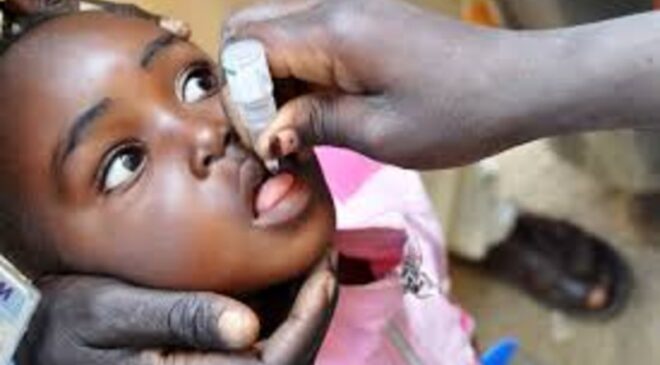
ABUJA/Nigeria: The Federal Government of Nigeria, in collaboration with the World Health Organization (WHO) and other global health partners, has reaffirmed its commitment to completely eradicate all forms of polio in the country by 2030 through sustained leadership, community engagement, and intensified vaccination campaigns.
The renewed commitment was underscored as Nigeria joined the rest of the world to mark World Polio Day on October 24, an annual event that serves as a reminder of the global pledge to eliminate poliomyelitis—a disease that can cause paralysis and lifelong disability.
Although Nigeria was certified free of wild poliovirus in 2020, the lingering challenge remains the elimination of circulating variant poliovirus type 2 (cVPV2), which still exists in some parts of the country.
For survivors like Hassana Mohammed Bunur from Borno State, who contracted polio as a toddler and now advocates for immunization, and Bukar Modu, a 45-year-old survivor who uses his experience to campaign for vaccination, the fight is both personal and urgent. “Had I been vaccinated, my life would be very different. But I can use my voice to protect others,” Modu said.
Government Leadership Driving Progress
The Federal Government, through the Federal Ministry of Health and Social Welfare (FMOH) and the National Primary Health Care Development Agency (NPHCDA), has continued to provide strong leadership in sustaining the gains of polio eradication. Nigeria’s target remains to halt all forms of poliovirus transmission by 2030, supported by robust surveillance, routine immunization, and supplementary immunization activities (SIAs).
Polio vaccination has also been integrated into broader health campaigns to ensure that every eligible child is reached. The ongoing 2025 Measles–Rubella and Polio Vaccination Campaign aims to immunize more than 106 million children, making it one of the largest public health campaigns in Africa.
National surveillance data show that as of October 2024, 112 cases of cVPV2 were reported across 15 states. By October 2025, the number had dropped to 66 cases in 44 local government areas across 12 states—a 41% reduction that reflects significant progress in interrupting transmission.
Partner Support and Strategic Collaboration
WHO and partners under the Global Polio Eradication Initiative (GPEI)—including UNICEF, Rotary International, the Bill & Melinda Gates Foundation, and the Chigari Foundation—continue to provide technical, financial, and logistical support to Nigeria’s eradication efforts.
Their contributions include training health workers, strengthening surveillance, coordinating vaccine delivery to hard-to-reach areas, and using data-driven strategies to identify and close immunization gaps. These efforts have led to the redeployment of vaccination teams, enhanced social mobilization, and targeted mop-up campaigns to ensure that no child is left behind.
Community Engagement Across States
Across the federation, WHO field offices and state health authorities marked World Polio Day with renewed advocacy and community sensitization activities.
In Taraba State, Commissioner for Health, Dr. Buma Bordiya, reaffirmed the government’s resolve to reach every child:
“On World Polio Day 2025, we renew our collective commitment to reach every child, with every vaccine, everywhere—until polio is gone for good.”
Over 2.3 million children in Taraba received at least one dose of the polio vaccine during the April–June SIAs.
In Gombe State, a 3-kilometre awareness walk was organized in partnership with the NYSC, Rotary, and community groups. In Ebonyi, the Commissioner for Health expressed gratitude to the federal government, WHO, and partners for supporting routine and supplementary immunization.
Similarly, in Kano State, more than 500 participants—including health officials, traditional leaders, and polio survivors—attended a commemorative event where the Chairman of the Polio Survivors Association called for sustained advocacy and the inclusion of survivors in outreach efforts.
Other states, including Kwara, Kebbi, Kaduna, and Zamfara, also held sensitization campaigns and reaffirmed their commitment to ensuring that every child is vaccinated.
A Shared Vision for a Polio-Free Future
For survivors like Hassana and Bukar, every vaccination drive represents hope for a new generation of children free from the pain and stigma of polio. “Polio is still a threat, but vaccines save lives,” Bukar said, urging caregivers to embrace immunization.
Reaffirming WHO’s commitment, Dr. Kofi Boateng, Polio Eradication Programme Cluster Lead, stated:
“The only reason the poliovirus continues to circulate is because some children remain unvaccinated. The vaccine is safe, effective, and every child must be protected.”
Staying the Course
Nigeria’s progress in eradicating all forms of polio remains one of Africa’s most significant public health achievements. However, experts stress that continued vigilance, funding, and community participation are crucial to achieving the 2030 target.
With strong government leadership, resilient communities, and unwavering partner support, Nigeria remains firmly on course toward a polio-free future—one where every child, everywhere, is protected.
